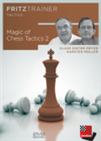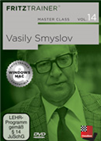
Strip or Massage?
Two ways of creating studies from games
By Steffen Slumstrup Nielsen
When Carlsen, Firouzja and the rest of the speed brains get together at super tournaments, I like following the live streams to be entertained and inspired. I am often struck by a beautiful move, a series of moves or an unusual tactical device from top games and indeed from games at all levels. Over-the-board games are one of four inspirations for me as a study composer. The others are: 1) previous studies/problems; 2) lines suggested by my computer; and 3) toying around with the pieces until something interesting occurs.
Surprisingly often I watch sequences of moves in games that do not remind me of anything from my previous chess memory. When this happens I hurry to the board – well, to the computer – hoping to put the idea from the game into a good form that is suitable for an (endgame) study.
Strip – the well proven method
 FM Claus Dieter Meyer has put under the microscope a comprehensive fund of topical and timeless games / fragments. On video Hamburg GM Dr. Karsten Müller has outlined corner points of Meyer's work and created 14 tests plus 10 interactive test sets.
FM Claus Dieter Meyer has put under the microscope a comprehensive fund of topical and timeless games / fragments. On video Hamburg GM Dr. Karsten Müller has outlined corner points of Meyer's work and created 14 tests plus 10 interactive test sets.The traditional way to deal with a promising game fragment is to strip it. By this I mean removing all the units that are not necessary for showing the idea. It is important, of course, to do this and to show the idea as economically as possible. Over-the-board players are not limited by such refined worries in their games, and it is often possible to remove a large number of pawns and even pieces from the game position without destroying the idea. Experienced study composers can do this fairly quickly, improving both the economy and weeding out possible side solutions. In the process the position might be shifted or even rotated, but the main aim is to lower the number of pieces involved. I don’t consider this process to be particularly creative, but rather somewhat mechanical.
When you use the strip method, most of your creative powers are used in the second part of creating the study. Once you have stripped the board of unnecessary units, you still need to create an introduction leading up to the idea borrowed from the game. Creating a good introduction is not a top quality of mine. Apart from the creative aspect of working backwards from a given position and creating play with pieces that are not on the board anymore, generating introductions is also exceptionally hard work. Duals are everywhere and often can only be dealt with by adding extra material, captures and even piece exchanges. Keeping the introduction clean and interesting is a real craft. The masters manage to add extra ideas to the introduction, but more often than not, composers are happy to make a workable introduction at all, and even that is hard work.
Here is a boiled-down illustration of such a composing process involving stripping away pieces.
If you click or tap the diagram, or anywhere in the above notation, you will get a large board on which you can follow the moves of the game. After that you can also click the evaluation graph to jump to decisive places in the game. Click on the fan icon to start an engine.
In my view, the move played by Dubov is perfectly suitable for stripping. In fact, it can be shown with only six pieces, removing no less than 12 pieces from the game position. The following is the final product by Martin Minski and me.
Dubov’s idea from the game is perfectly kept, and thanks to Martin's skills we managed to create an introduction without a single capture and with the extra point of 4.Db2!
The second part of this series, "Massage – altering the idea", will appear here soon.
The above article appeared in the Macedonian Problemist, issue no. 67 (January-April 2022). We reproduce it with the kind permission of the editor Zoran Gavrilovski.

Zoran Gavrilovski on TMP:
"The Macedonian Problemist" ("TMP") is a non-commercial venture. Issues with consecutive order of pages published on my Facebook page. They are also e-mailed to 150-200 recipients, are free of charge and shareable without any charge or specific consent from my side, under the proviso that these issues are not subject to purchase/sale.
 Smyslov cultivated a clear positional style and even in sharp tactical positions often relied more on his intuition than on concrete calculation of variations. Let our authors introduce you into the world of Vasily Smyslov.
Smyslov cultivated a clear positional style and even in sharp tactical positions often relied more on his intuition than on concrete calculation of variations. Let our authors introduce you into the world of Vasily Smyslov.Payment is only required if you wish to receive printed issues (EUR 15 for 2022, EUR 9-15 for earlier sets of annual issues, depending on the number of issues and pages per year), or PDF for the purpose of printing the issues on your own PC. For such PDFs there is 50% discount of the price mentioned above.
TMP has established itself as one of the top 20 chess composition magazines. In the last printed FIDE Album 2013-15, out of the total number of 1,499 selected chess compositions (problems and studies) there were 46 problems from TMP, which places it at the 7th place in the unofficial table/ladder of magazines or other outlets with a highest number of selected chess compositions in the FIDE Album 2013-2015, or at the 9th Place in the list of most represented sources in the FIDE Album 2013-2015. I consider the above success as outstanding, because TMP is a low-profile venture with regular involvement of a few persons other than me (notably: the proof-reader Predrag Zuvic from Croatia, the regular judge of ''TMP'' tourneys Hans Gruber, the all-time most successful chess composer Petko Petkov from Bulgaria with his excellent original problems and thematic articles, excellent language editors such as Geoff Foster from Australia and other occasional collaborators who support the magazine with free of charge assistance). The magazine has no stable financial basis, and it would be fair to say that it would have been unsustainable and defunct if it weren't for my dedicated perseverance to keep its publication throughout the years.
Links
























